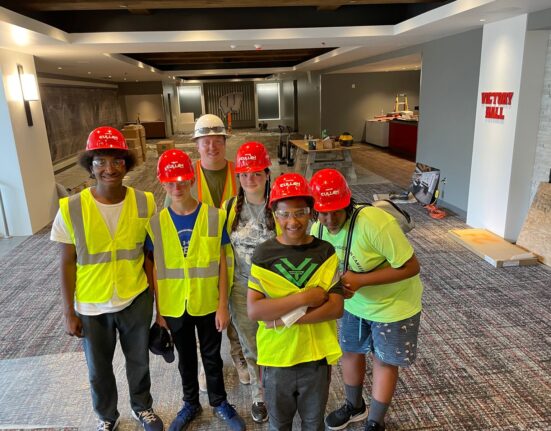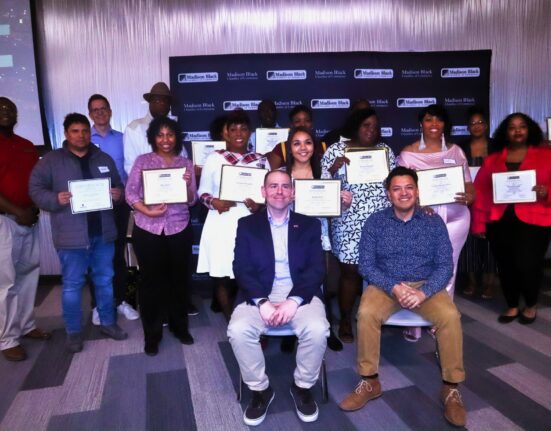
Madison College held its first In Community dinner to invite community members and organizations to hear about its efforts Thursday.
A first of its kind event for Madison College, the teams working to create an equitable and inclusive environment for its students took the time to proclaim its dedication to DEI efforts. The In Community dinner brought out nearly 100 attendees for its first round as Madison Technical College received feedback from the community on how it currently serves and what it could improve on.
The two-hour event in the evening hosted speakers from the college’s Equity and Inclusion team with Chevon Brown and, VP of Equity and Inclusion, Dr. Damira Grady along with remarks from president of the college Dr. Jack E. Daniels III. The event occurred a bit over an hour after the Wisconsin’s Joint Committee on Finance (JCF) voted to defund DEI at UW Systems.
“This is about community and we would not be here without the community. This cause is about students — how to best serve students — all students,” Dr. Daniels III said. “And I have to say all students because I was thoroughly disturbed about politics, and I was disturbed about the direction that many states are going.”
In his opening remarks, Dr Daniels III took issue with the recent UW budgetary vote and the remarks from some JCF members. He still holds high regards and hope for Madison Technical College to foster an inclusive and equitable environment for its students.

“I heard some of the comments that some of our legislators made and they’re disturbing,” he said. “I’m so proud of everyone in Madison College. They have taken that mantle to serve everyone that comes through that door.”
Brown followed President Daniels to tell a bit more about Madison College’s efforts and continued dedication in equity and inclusion.
“Madison College’s current version of our equity and inclusion plan was designed to provide a framework for the ways in which we implement our programming, the ways in which we build and enhance our partnerships and also the ways that we develop safe spaces for our students and employees — especially the most marginalized and often individual population,” Brown said.
Madison College highlighted its statement for equity and inclusion. Its focus is on the elimination of racist policies, practices and procedures to achieve a more equitable outcome for its students. The college aims to create an anti-racist institution through its efforts. It tries to achieve anti-racism through examining its curriculum, professional development, addressing implicit biases and fair discipline policies based on data from internal and external feedback. The survey Madison College distrusted at In Community paves a way for it to address that.
The survey’s data can be broken down into four categories: physical, social, emotional and economic.
“A couple of our students talked about how we increased the student wage to $15 an hour… and how they felt that we were getting to a livable wage, but then after they graduate, what will the job market look like for them? How will they be able to afford to live in Madison,” Dr. Grady said. “They talked about universal things that all people talk about. It’s not about race or isms or DEI work, but kind of this universal concept that we’re all kind of struggling.”
Dr. Grady is currently in her second year as VP of Equity and Inclusion. She sees Madison College in a unique position to help its students in a way it could not when she worked in DEI in UW Systems. Where UW DEI often had worked in theoretical applications, Madison College approaches it in a practical sense. Its ability to rapidly tailor its services to student needs is the foundation for how Madison College can continue to serve its students, according to Dr. Grady. The In Community dinner was just a start to larger plans.
Two issues given voice at the event were childcare services and professional development. With a continuously larger swath of nontraditional students who balance family and work, Madison College looks for constant feedback on how it can meet their needs.
The In Community dinner is slated to become an annual event. Madison College’s Equity and Inclusion office plans to scale the function with additional offerings that will be determined in the future.






